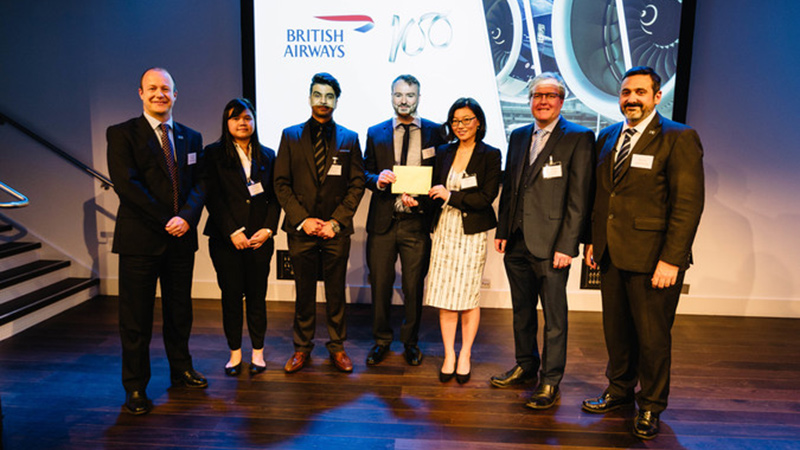Published:

An international team of scientists and academics from Heriot-Watt University have finished runners-up in a UK-wide competition to develop an aviation fuel of the future.
Researchers from the University's School of Engineering and Physical Sciences and from the School of Social Sciences have developed a greener, sustainable fuel as part of British Airways BA2119 Future of Fuels Challenge.
Heriot-Watt fended off strong competition from around the country to reach the final of the event held in central London today (Friday, May 3).
I am extremely proud of everyone in the team who has contributed so much to this project and we will continue to work together as we look towards taking this research to the next stage.
University College London, were eventually crowned victors by a panel of industry experts including representatives from the Department for Transport with Heriot-Watt finishing runners-up with London School of Economics.
Commenting on the team's achievement is its project lead, Professor Mercedes Maroto-Valer, Assistant Deputy Principal (Research & Innovation) and Director of Research Centre for Carbon Solutions (RCCS), who said: “The pursuit of developing cleaner, more sustainable forms of fuel is something many institutions across the globe are increasingly investing more time in. To reach the final of the British Airways BA2119 Future Fuels Challenge underlines our reputation as a leader in this area.
“I am extremely proud of everyone in the team who has contributed so much to this project and we will continue to work together as we look towards taking this research to the next stage.”
Funded by the Engineering and Physical Sciences Research Council (EPSRC) and with partners in the UK, the University team successfully produced a small quantity of environmentally friendly fuel made from waste wooden pellets and carbon dioxide. The pellets are heated in a gasification unit to create carbon monoxide and hydrogen while, separately, waste carbon dioxide is put through an electrolyser to form a second gas.
The final process sees both gasses combined, resulting in liquid fuel.
The team intends for this green alternative to one-day replace existing aviation fuel and help reduce the aviation industry's carbon footprint.
Passing on his congratulations is Professor Richard A. Williams, Principal and Vice-Chancellor of Heriot-Watt University, who said: “The team has done tremendously well to finish runners-up in such a prestigious competition and I wish to take this opportunity to congratulate everyone.
“One of the great strengths we have here at Heriot-Watt University is our desire to deliver a low carbon and sustainable society.
“Working with British Airways on the vitally important issue of reducing carbon output in the aviation industry underlines the tremendous expertise we have at this university.”
The final of the competition comes in the same week the Committee on Climate Change (CCC) published its new report calling on the UK to lead the global fight against climate change. The independent advisory group to the UK government laid outs its ambition for the country to cut greenhouse gasses to nearly zero by 2050.
Last November, British Airways, in collaboration with Cranfield University, challenged academics from across the UK to develop a sustainable alternative fuel which could power a commercial aircraft on a long-haul flight, carrying up to 300 customers with zero net emissions.
Professor Graham Braithwaite, Director of Transport Systems at Cranfield University and the challenge's lead judge said: “The quality of entries was amazing, and a great reminder of the talent that exists within British universities. We are delighted to have had the opportunity to partner with British Airways for the BA 2119: Future of Fuels challenge, which will play an extremely important role in delivering sustainable aviation in the future.”
IAG, British Airways' parent company, will invest a total of $400m on alternative sustainable fuel development over the next 20 years. British Airways is also the first airline in Europe to invest in building a plant, with renewable fuels company, Velocys, which converts organic household waste into renewable jet fuel to power its fleet.
The members of the Heriot-Watt University team are:
Dr John Andresen, Team Captain and Sustainability specialist
Dr Bing Xu, Team vice-captain and Socio-economic specialist
Dr Ben Kolosz, Sustainability specialist
Dr Waqas Hassan Tanveer, Innovation specialist
Tipwadee Jumpaengjan, Innovation specialist